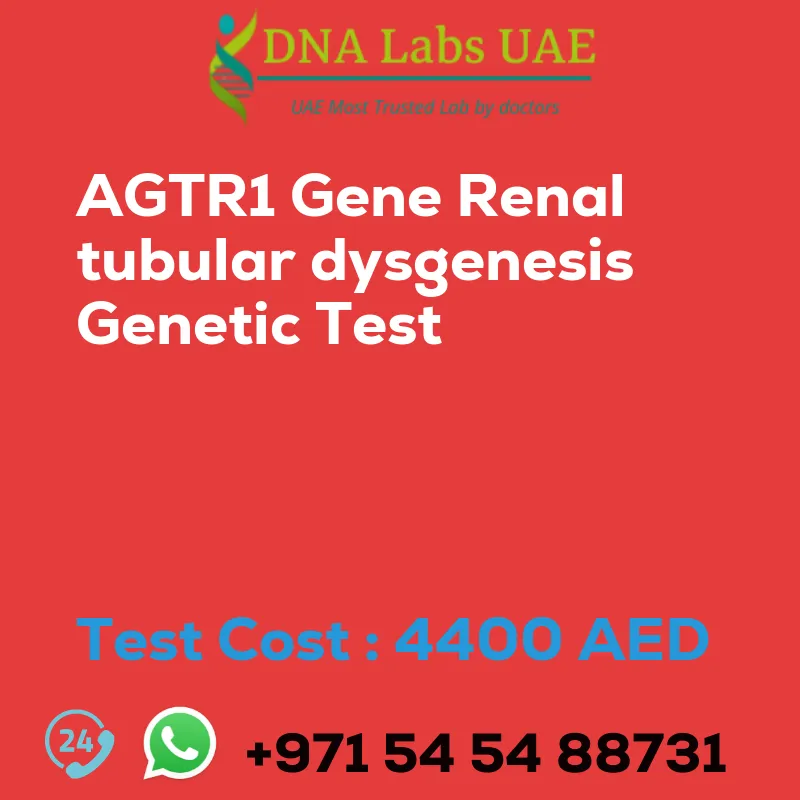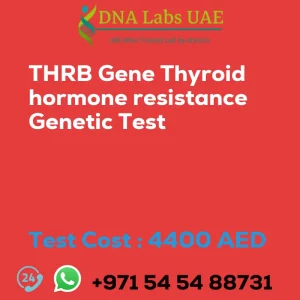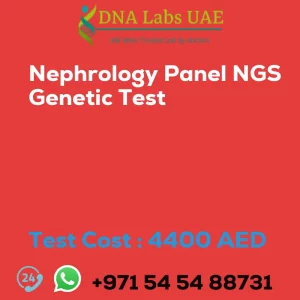AGTR1 Gene Renal Tubular Dysgenesis Genetic Test
Welcome to DNA Labs UAE, where we offer comprehensive genetic testing services. Today, we will be discussing the AGTR1 Gene Renal Tubular Dysgenesis Genetic Test, its components, cost, symptoms, diagnosis, and other important details.
Test Details
The AGTR1 gene is associated with a rare genetic disorder called renal tubular dysgenesis (RTD). This condition affects the development of the kidneys, specifically the renal tubules. The renal tubules play a crucial role in filtering waste products from the blood and reabsorbing essential substances back into the body.
Mutations in the AGTR1 gene can disrupt the normal development and function of the renal tubules, leading to severe impairment of kidney function. This can result in various symptoms, including low amniotic fluid levels during pregnancy, abnormal kidney development, and early-onset kidney failure in newborns.
Components and Price
The AGTR1 Gene Renal Tubular Dysgenesis Genetic Test costs AED 4400.0. The test requires a blood sample for analysis.
Method
The AGTR1 Gene Renal Tubular Dysgenesis Genetic Test is conducted using NGS (Next-Generation Sequencing) technology. NGS allows for the simultaneous analysis of multiple genes, providing a comprehensive genetic profile.
Test Type and Doctor
The AGTR1 Gene Renal Tubular Dysgenesis Genetic Test falls under the field of Hepatology, Nephrology, and Endocrinology Disorders. It is typically recommended to consult with a General Physician before undergoing this test.
Test Department
The AGTR1 Gene Renal Tubular Dysgenesis Genetic Test is conducted in our Genetics department.
Pre-Test Information
Before undergoing the AGTR1 Gene Renal Tubular Dysgenesis Genetic Test, it is essential to provide the clinical history of the patient. Additionally, a genetic counseling session may be conducted to draw a pedigree chart of family members affected by the AGTR1 gene.
Report Delivery
The report for the AGTR1 Gene Renal Tubular Dysgenesis Genetic Test is typically delivered within 3 to 4 weeks.
Importance of Genetic Testing
Genetic testing for RTD is recommended for individuals with a suspected or confirmed diagnosis of the condition. It can provide crucial information for genetic counseling and family planning. However, it is important to note that genetic testing can be complex and should be done under the guidance of a healthcare professional or genetic counselor who can provide appropriate counseling and interpretation of the results.
At DNA Labs UAE, we prioritize accurate and reliable genetic testing to assist in the diagnosis and management of various genetic disorders. Contact us today to schedule your AGTR1 Gene Renal Tubular Dysgenesis Genetic Test.
| Test Name | AGTR1 Gene Renal tubular dysgenesis Genetic Test |
|---|---|
| Components | |
| Price | 4400.0 AED |
| Sample Condition | Blood |
| Report Delivery | 3 to 4 Weeks |
| Method | NGS Technology |
| Test type | Hepatology Nephrology Endocrinology Disorders |
| Doctor | General Physician |
| Test Department: | Genetics |
| Pre Test Information | Clinical History of Patient who is going for AGTR1 Gene Renal tubular dysgenesis NGS Genetic DNA Test. A Genetic Counselling session to draw a pedigree chart of family members affected with AGTR1 Gene Renal tubular dysgenesis NGS Genetic DNA Test gene AGTR1 |
| Test Details |
The AGTR1 gene is associated with a condition called renal tubular dysgenesis (RTD). RTD is a rare genetic disorder that affects the development of the kidneys, specifically the renal tubules. The renal tubules are responsible for filtering waste products from the blood and reabsorbing essential substances back into the body. Mutations in the AGTR1 gene can disrupt the normal development and function of the renal tubules, leading to severe impairment of kidney function. This can result in a variety of symptoms, including low amniotic fluid levels during pregnancy, abnormal kidney development, and early-onset kidney failure in newborns. NGS (Next-Generation Sequencing) genetic testing is a type of genetic test that uses advanced sequencing technology to analyze multiple genes simultaneously. In the case of renal tubular dysgenesis, NGS genetic testing can be used to identify mutations in the AGTR1 gene that may be causing the condition. This can help with the diagnosis of RTD and provide important information for genetic counseling and family planning. It is important to note that genetic testing for RTD is typically recommended for individuals with a suspected or confirmed diagnosis of the condition. Genetic testing can be complex and should be done under the guidance of a healthcare professional or genetic counselor who can provide appropriate counseling and interpretation of the results. |








